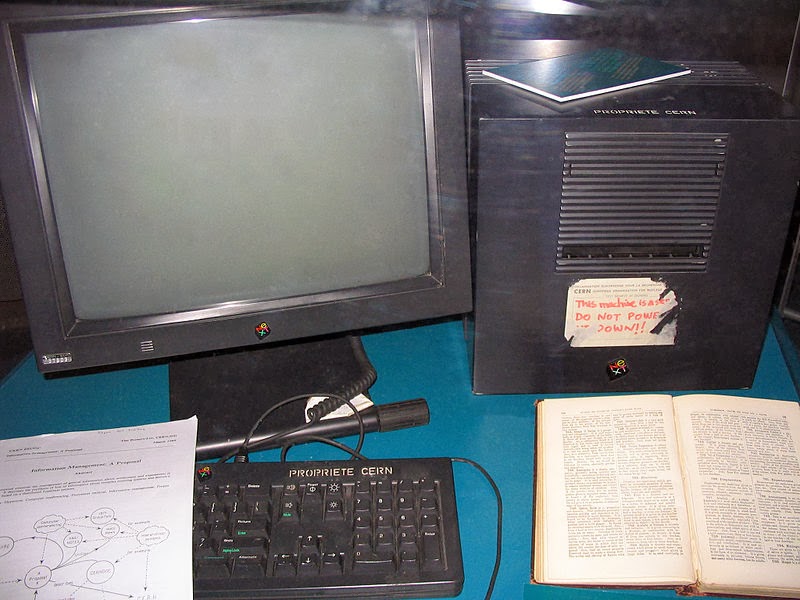يسعدنا بمناسبة العيد الخامس والعشرين لشبكة الويب أن ننشر مشاركة ضيف المدونة، السير تيم بيرنرز لي، مبتكر الويب. يلقي تيم من خلال هذه المشاركة الضوء على ماضي شبكة الإنترنت وحاضرها ومستقبلها، كما يدعو للدفاع عن حرية الشبكة وانفتاحها. -Ed.
وعلى الرغم من أنه لم يكن بمقدور معمل CERN باعتباره معملاً فيزيائيًا إثبات مدى جدوى هذا المشروع البرمجي العام، فقد سمح لي رئيسي مايك سندال بالعمل عليه بالإضافة إلى عملي الأساسي. وفي عام 1990 كتبت أول متصفح وأداة تحرير. وبعد إلحاح طويل أعلن معمل CERN في عام 1993 عن إمكانية طرح تكنولوجيا WWW للجميع بدون دفع مقابل مدى الحياة.
أول خادم ويب استخدمه تيم بيرنرز لي صورة من Wikipedia
كيف حدث هذا؟ لقد تم عن قصد تصميم البنية الأساسية لشبكة الإنترنت والشبكة العنكبوتية بتسلسل غير هرمي وبدون مركزية أو أية قيود على الإطلاق. وذلك مع مراعاة إتاحة الويب للعمل على أي نوع من المعلومات والأجهزة والبرامج واللغات. ذلك أنه يمكنك من خلال هذه الشبكة توصيل أية معلومة مهما كانت، ولن تحتاج إلى طلب إذن. وبذلك لا تتقيد حريتك في إنشاء المحتوى بأية قيود سوى قيود خيالك.
وبناءْ على ما تقدم، يحق لنا اليوم أن نحتفل، بل وأن نفكر ونتناقش، ومن ثم ننفذ. فهناك قرارات مصيرية تتعلق بحوكمة الإنترنت ومستقبلها قد بدأت في الظهور، ولذلك يلزمنا جميعًا أن نعلن رأينا صريحًا بشأن مستقبل الويب. كيف نضمن انضمام نسبة الـ 60% الباقية من سكان العالم إلى شبكة الإنترنت في أقرب وقت؟ كيف نضمن توفر شبكة الإنترنت بجميع اللغات والثقافات، وليس على مستوى الثقافات السائدة فقط؟ كيف يمكننا الوصول إلى إجماع بشأن المعايير المفتوحة للاتصال بما يعرف باسم "إنترنت الأشياء"؟ هل سنسمح لأحد بوضع أُطر وقيود على استخدامنا لشبكة الإنترنت، أم سندافع عن فكرة انفتاح شبكة الويب وما نجنيه بفضل ذلك من حق في التعبير عن رأينا واستكشاف الأشياء وابتكارها؟ كيف لنا أن نصمم أنظمة للفصل بين السلطات يمكننها إخضاع الجماعات التي تسعى للتجسس على الشبكة لمساءلة الجمهور؟ هذه بعض الأسئلة التي أريد طرحها؛ ولكن ماذا عن أسئلتكم أنتم؟
يسعدني بمناسبة العيد الخامس والعشرين لشبكة الويب أن أطلب منكم الانضمام إلينا لمساعدتنا في تصور معايير لمستقبل الويب ووضعها، والانضمام إلينا كذلك في توفير شبكة ويب حرة ومنفتحة للجميع من خلال الضغط على كل بلد من البلدان التي تسعى إلى فرض مواثيق حقوق على استخدام الشبكة. يمكنك التعرف على مزيد من المعلومات من خلال موقع الويب webat25.org، كما يمكنك طرح وجهة نظرك في شبكة الويب التي نحتاج إليها من خلال علامة التصنيف #web25.
الناشر: تيم بيرنرز لي، مبتكر شبكة الإنترنت
On the 25th anniversary of the web, let’s keep it free and open
On the 25th anniversary of the World Wide Web, we’re pleased to share this guest post from Sir Tim Berners-Lee, the inventor of the web. In this post he reflects on the past, present and future of the web—and encourages the rest of us to fight to keep it free and open. -Ed.
Today is the web’s 25th birthday. On March 12, 1989, I distributed a proposal to improve information flows: “a ‘web’ of notes with links between them.”
Though CERN, as a physics lab, couldn’t justify such a general software project, my boss Mike Sendall allowed me to work on it on the side. In 1990, I wrote the first browser and editor. In 1993, after much urging, CERN declared that WWW technology would be available to all, without
paying royalties, forever.
.
The first web server, used by Tim Berners-Lee. Photo via Wikipedia
How has this happened? By design, the underlying Internet and the WWW are non-hierarchical, decentralized and radically open. The web can be made to work with any type of information, on any device, with any software, in any language. You can link to any piece of information. You don’t need to ask for permission. What you create is limited only by your imagination.
So today is a day to celebrate. But it’s also an occasion to think, discuss—and do. Key decisions on the governance and future of the Internet are looming, and it’s vital for all of us to speak up for the web’s future. How can we ensure that the other 60 percent around the world who are not connected get online fast? How can we make sure that the web supports all languages and cultures, not just the dominant ones? How do we build consensus around open standards to link the coming Internet of Things? Will we allow others to package and restrict our online experience, or will we protect the magic of the open web and the power it gives us to say, discover, and create anything? How can we build systems of checks and balances to hold the groups that can spy on the net accountable to the public? These are some of my questions—what are yours?
On the 25th birthday of the web, I ask you to join in—to help us imagine and build the future standards for the web, and to press for every country to develop a digital bill of rights to advance a free and open web for everyone. Learn more at webat25.org, and speak up for the sort of web we really want with #web25.
Posted by Sir Tim Berners-Lee, Inventor of the World Wide Web